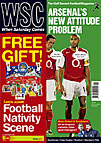 A flop at Bradford, a controversial figure at Middlesbrough – this former England skipper is seeking managerial redemption at West Brom. Matt Rickard reports
A flop at Bradford, a controversial figure at Middlesbrough – this former England skipper is seeking managerial redemption at West Brom. Matt Rickard reports
It seems perverse that Bryan Robson should find himself managing again in the Premiership so soon after an ignominious seven months in charge of Bradford City. Wasn’t this the man who couldn’t buy a job after his time at Middlesbrough that ended shortly after a chastening call to Terry Venables? And this despite a desperate flurry of CV writing, only matched by the deadening thud of rejection letters.
But just as one former England captain was making as big a hash of resigning his job at Wycombe as he had done of managing, West Bromwich Albion were turning to another in their fight to stay up. Robson had hawked himself around from Lagos to Stoke, but now he was back. As a footballer, Robson was peerless. Sir Alex Ferguson noted in his autobiography: “He was a miracle. A human marvel who carried an aura about him.” For the first two years, he made the transition to manager look easy. Not content with winning promotion and establishing Boro in the Premiership, Robson assisted Venables to the Euro 96 high against Holland. Stuart Bargewell, chairman of the Middlesbrough Supporters’ Club, is in no doubt. “Before Robson, we were looking at Ayresome Park and a fanbase of around 8,000. He got us playing wonderful football and raised the bar just by being here.”
Of course, money was a factor. Initially, free transfers arrived in the form of Clayton Blackmore and Nigel Pearson – now assistant to Robson at The Hawthorns. But exotic, and exotically priced, signings weren’t far behind. By the end of his seven-year reign, Robson had spent nearly £79 million on players, one of whom was Fabio, the cousin of Brazilian midfielder Emerson, who arrived on a family visit and ended up as a regular in the reserves. Sublime performances that took the club to both domestic cup finals in 1996-97 were rarely repeated in the Premiership. Robson’s failure to impose his own image on his team was his undoing – Middlesbrough had become a group of individuals. The deduction of three points, after the club had naively decided not to fulfil a fixture at Blackburn due to illness, caused Boro to be relegated.
Mark Schwarzer, signed by Robson in July 1997, admits the problem lay with the players. “The most disheartening thing about it all was seeing the way certain players took advantage of his kindness. He always gave 100 per cent himself as a player but, as a manager, he couldn’t understand it when others didn’t. It’s as plain and simple as that.”
Throughout, one thing remained constant: the support of the chairman, Steve Gibson. Robson, despite diminishing returns, appeared unsackable and in the end the parting shot was self-inflicted. The call to Venables in November 2000, after seven successive defeats, might have been seen as a selfless example of Robson putting the club first. But such an arrangement only saw him marginalised and mocked. Tel got the credit as the team recovered to finish 14th and Robson did not work again in almost two-and-a-half years, though not for want of trying. His name appeared in the press whenever a vacancy came up at any club in the top two divisions, but Robson seemed forlorn, thought of as nothing without a chequebook. An attempt to become an international manager ended in embarrassment and confusion when the Nigerian FA denied any knowledge of the “representatives” who had spoken to him about the job.
Salvation eventually arrived with Bradford City and, though his record of 20 defeats in 28 games sealed the Bantams’ fate, it did have the unexpected effect of making Robson employable again, though West Brom sought assurances about an alleged “drinking culture” at his previous clubs before appointing him.
There has been much revisionism in the media in the light of Robson’s return – particularly a claim that he recouped more than £60m of his outlay through player sales. The reality is £45m, which equates to a net spend just shy of £5m a year. Could Middlesbrough have expected more than a highest Premiership finish of ninth and three losing cup finals? Steve McClaren doesn’t think so. “Bryan did a terrific job at Boro and built the platform on which we could build.”
Robson’s first West Brom match saw a point lost to Kanu’s remarkable miss, which was followed by a highly creditable draw at Highbury. But a 3-0 home lamping by Manchester United left the Baggies bottom: does Robbo still have Venables’s phone number?
From WSC 215 January 2005. What was happening this month